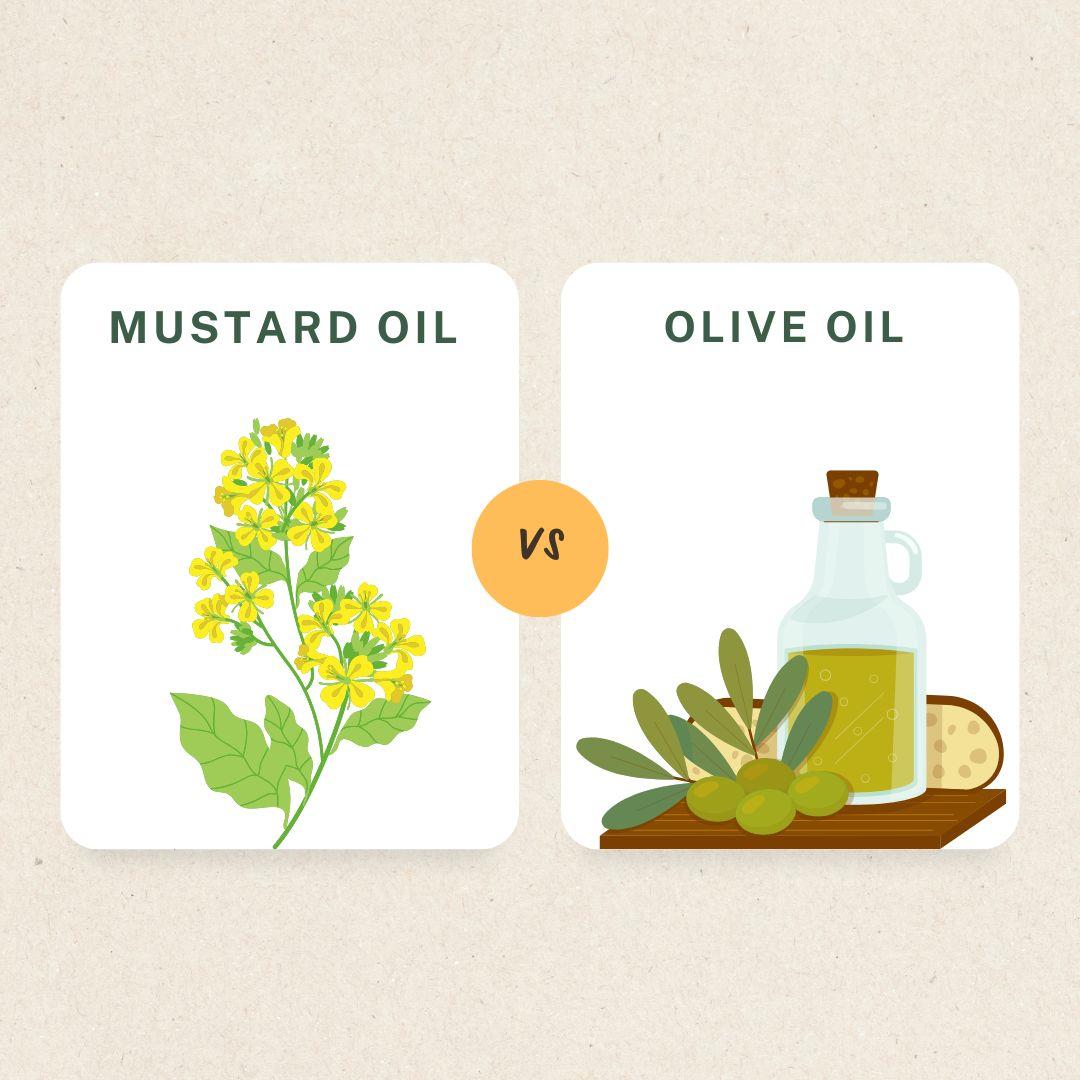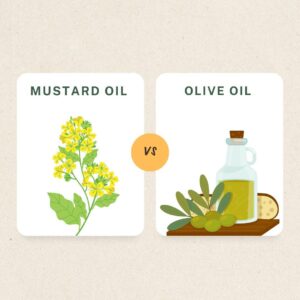
Mustard Oil vs Olive Oil
Cooking oils are an essential part of our daily lives, influencing not only the taste of our food but also our overall health. Among the most popular oils globally are mustard oil and olive oil, each offering unique benefits and characteristics. While mustard oil is deeply rooted in Indian culinary traditions, olive oil has gained popularity worldwide for its association with the Mediterranean diet. This blog provides an in-depth comparison of mustard oil and olive oil, helping you decide which one is better suited for your health goals, cooking needs, and lifestyle preferences.

What Are Mustard Oil and Olive Oil?
Mustard Oil
Mustard oil is extracted from mustard seeds (Brassica species) and is characterized by its pungent aroma and robust flavor. It has been used for centuries in Indian cooking, Ayurveda, and traditional medicine. Mustard oil is particularly valued for its high smoke point, making it ideal for frying and sautéing.
Olive Oil
Olive oil is derived from olives (Olea europaea) and is celebrated for its mild flavor and versatility. It is a cornerstone of the Mediterranean diet and comes in various types, including extra virgin olive oil (cold-pressed) and refined olive oil. Olive oil is often used in dressings, marinades, and low-heat cooking.
Nutritional Comparison
| Component | Mustard Oil | Olive Oil |
|---|---|---|
| Calories | 884 per 100g | 884 per 100g |
| Saturated Fats | 11% | 13% |
| Monounsaturated Fats | 59% | 72% |
| Polyunsaturated Fats | 21% | 10% |
| Omega-3 Fatty Acids | High | Low |
| Vitamin E | 34 mg | 14 mg |
| Vitamin K | 5.4 mcg | 62 mcg |
Both oils are calorie-dense but differ significantly in their fat composition. Mustard oil has a balanced omega-3 to omega-6 ratio, while olive oil excels in monounsaturated fats.
Health Benefits
Mustard Oil
-
Heart Health: The omega-3 fatty acids in mustard oil help reduce bad cholesterol (LDL) levels while increasing good cholesterol (HDL), supporting cardiovascular health.
-
Anti-inflammatory Properties: Mustard oil contains allyl isothiocyanate, which reduces inflammation in joints and muscles.
-
Digestive Aid: It stimulates digestive enzymes, aiding digestion and nutrient absorption.
-
Antibacterial Effects: Mustard oil’s antimicrobial properties help fight bacterial infections when consumed or applied topically.
Olive Oil
-
Cardiovascular Benefits: Olive oil’s high monounsaturated fat content lowers LDL cholesterol while raising HDL cholesterol, reducing the risk of heart disease.
-
Rich in Antioxidants: Polyphenols and Vitamin E protect cells from oxidative stress, reducing the risk of chronic diseases like cancer.
-
Anti-inflammatory Effects: Olive oil soothes inflammation in conditions like arthritis or digestive issues.
-
Brain Health: Regular consumption of olive oil may improve cognitive function due to its antioxidant properties.
Cooking Applications
Mustard Oil
-
Ideal for high-heat cooking methods like frying and sautéing due to its high smoke point (480°F or 250°C).
-
Adds a bold flavor to dishes, making it perfect for Indian curries, marinades, and pickles.
-
Commonly used in tempering spices to enhance their aroma.
Olive Oil
-
Best suited for low to medium heat cooking methods like sautéing or baking due to its lower smoke point (375–410°F or 190–210°C).
-
Extra virgin olive oil is ideal for raw applications like salad dressings or drizzling over cooked dishes to preserve its delicate flavor.
-
Works well in Mediterranean recipes like pasta sauces or roasted vegetables.
Skin and Hair Care Benefits
Mustard Oil
-
Promotes hair growth by stimulating blood circulation when massaged onto the scalp.
-
Treats dandruff with its antifungal properties.
-
Moisturizes dry skin while reducing minor infections.
-
Improves blood circulation when used as a massage oil.
Olive Oil
-
Acts as a natural moisturizer for skin due to its high Vitamin E content.
-
Helps repair damaged hair strands when applied as a conditioner.
-
Reduces inflammation on sensitive skin.
-
Protects against free radical damage with its antioxidant-rich profile.
Environmental Impact
Mustard Oil
-
Mustard plants require less water compared to olives, making mustard oil more sustainable in certain regions.
-
Typically produced locally in areas where it is commonly consumed.
Olive Oil
-
Large-scale olive farming can lead to soil depletion if not managed sustainably.
-
Concerns about water usage in arid regions where olives are cultivated extensively.
Choosing Between Mustard Oil and Olive Oil
The choice between mustard oil and olive oil depends on several factors:
-
Flavor Preference: If you enjoy bold flavors, mustard oil is ideal; olive oil’s mild taste suits lighter dishes.
-
Cooking Style: Mustard oil’s high smoke point makes it better for frying; olive oil works well for baking or salad dressings.
-
Health Goals: Mustard oil’s omega-3 content supports heart health; olive oil’s antioxidants benefit overall wellness.
-
Skin/Hair Care Needs: Both oils offer unique advantages—mustard oil nourishes hair follicles while olive oil hydrates skin deeply.
FAQs About Mustard Oil vs Olive Oil
Which is better for heart health?
Olive oil may have an edge due to its higher monounsaturated fat content; however, mustard oil’s balanced omega profile also supports cardiovascular health.
Can I use both oils interchangeably?
Yes! You can use both oils depending on the dish or application—mustard oil for bold flavors and frying; olive oil for mild flavors and raw applications.
Is mustard oil safe for everyday use?
Yes! However, moderation is key as excessive consumption may lead to erucic acid buildup (in non-refined varieties).
Which is better for skin care?
Olive oil is better for moisturizing dry skin due to its high Vitamin E content; mustard oil can treat infections or improve circulation.
Is mustard oil safe for cooking?
Yes, mustard oil is safe for cooking. It has a high smoke point, making it suitable for frying and sautéing. However, it’s essential to use food-grade mustard oil that is specifically labeled for culinary use.
Can I use olive oil for frying?
While you can use olive oil for frying, it’s best suited for low to medium heat cooking. Extra virgin olive oil has a lower smoke point than refined olive oil, so it’s not recommended for high-heat frying.
Which oil is better for heart health?
Both oils have heart health benefits, but olive oil is often considered superior due to its high content of monounsaturated fats and antioxidants, which support cardiovascular health.
Can mustard oil help with hair growth?
Yes, mustard oil is believed to stimulate hair growth when massaged into the scalp. It improves blood circulation and nourishes hair follicles, potentially leading to healthier hair.
Is olive oil good for skin hydration?
Yes! Olive oil is an excellent moisturizer due to its high content of fatty acids and Vitamin E. It helps hydrate the skin and can be used as a natural remedy for dry skin.
Are there any side effects of using mustard oil?
Some individuals may experience skin irritation or allergic reactions when using mustard oil topically. It’s advisable to perform a patch test before extensive use.
How should I store mustard oil and olive oil?
Both oils should be stored in a cool, dark place in airtight containers to prevent oxidation. Avoid exposing them to direct sunlight or heat sources.
Can I use both oils in my diet?
Yes! Incorporating both mustard oil and olive oil into your diet can provide a variety of flavors and health benefits. Just be mindful of the quantities used, as both oils are calorie-dense.
Which oil is better for salad dressings?
Olive oil is typically preferred for salad dressings due to its mild flavor and smooth texture. Extra virgin olive oil adds a rich taste that complements salads well.
Can I use mustard oil as a massage oil?
Yes, mustard oil can be used as a massage oil due to its warming properties and ability to improve blood circulation. It can also help relieve muscle tension when massaged onto sore areas.
Conclusion
Both mustard oil and olive oil have distinct advantages depending on your needs—whether it’s cooking flavorful dishes or improving your overall health through their unique nutritional profiles. While mustard oil stands out with its bold flavor and anti-inflammatory properties, olive oil shines with its mild taste and high antioxidant content.
By understanding their differences in composition, culinary uses, health benefits, and environmental impact, you can choose the right option that aligns with your lifestyle preferences! Always remember that balance is key when incorporating oils into your diet or beauty routine!
